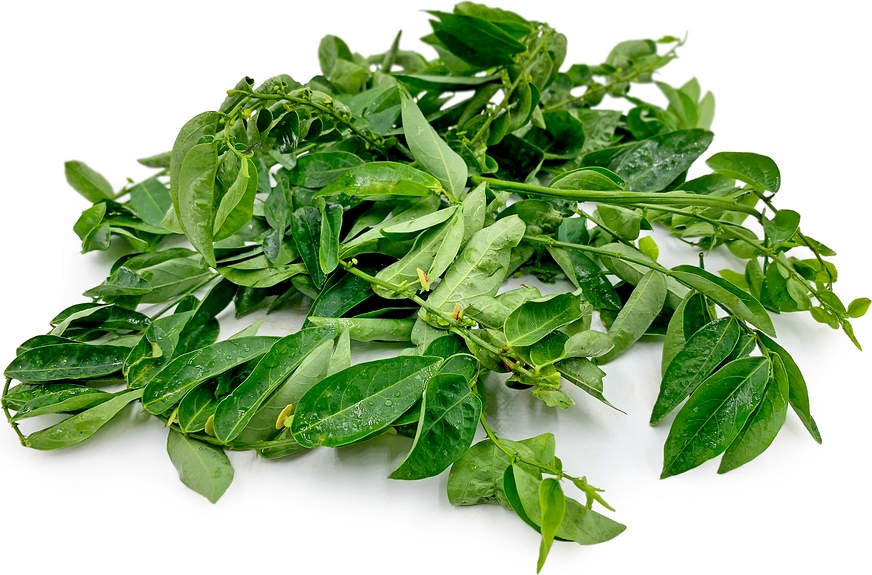This Malaysian sayur may help you lose weight. It may also give you a deadly lung disease.

- 1.3KShares
- Facebook1.2K
- Twitter7
- LinkedIn12
- Email14
- WhatsApp72
Malaysians aren’t eating enough sayur-sayuran, and probably nobody knows this better than the mamaks who hear “Tak mau sayur ah” like 80 times a day. Honestly, we get it. Why eat green stuff when we have roti canai and nasi lemak ayam goreng?

Hard as it is for some veggie haters to accept, some Truly Delectable Malaysian Dishes That Are Also Sensational™ can only happen with them. Case in point: the sayur manis, aka mani cai (manis veggie?) for the Chinese people, aka cekur manis for Semenanjung people, aka Sauropus androgynous for scientists.
This sayur can be stir fried much like kangkung, made into egg soup, in masak lemak, used as the vegetable side for pan mee in lieu of pucuk ubi, or even thrown into a sad bowl of Maggi to make it happier. As for the taste, well, they don’t call it sayur manis for nothing. As described by an ang moh who had some in Sabah…
“…sayur manis tasted both rich and nutritious, like very good spinach. But it had more complexity than spinach, as though it had been fortified with broccoli and infused with asparagus. The flavor itself wasn’t so much novel as it was a recombination of familiar tastes in a new and exciting way.” – Konstantin Kakaes, writing for NPR.
However, if you Google up enough of its recipes, you’re bound to run into some sort of warning that it can cause lung problems, or that the leaves are toxic. While that warning might have the same energy as anti-vaxxer propaganda, there might be some truth to it, as…
Sayur manis have been linked to a rare, untreatable lung disease in Taiwan
Sometime in the 1990s, sayur manis became popular in Taiwan as a weight loss food. During this fad, the leaves of this sayur were usually blended together with guava or pineapple to make a smoothie.

It was later found that the veggie contains a compound called 3-O-β-D-glucosyl-(1-6)-β-D-glucosyl-kaempferol, or GGK for short. This compound apparently has promise as a weight loss drug, as rats fed with GGK ate about 15% less food, and therefore lost more weight than rats not fed with the stuff, with no obvious side effects.
However, GGK isn’t the only compound found in sayur manis. After chugging down some sweet sayur juice, hundreds of the Taiwanese fad dieters developed a rare kind of lung disease called bronchiolitis obliterans, aka popcorn lung. In essence, it causes your lungs to get permanently damaged, and save for slowing down the damage or getting a lung transplant, there’s no way to cure it.

With hundreds of cases of a rare disease popping up all of a sudden, it didn’t take long for researchers to notice that people who regularly took sayur manis smoothies developed the disease. However, it’s still not clear which chemical in the sayur is causing it. One popular view was that it was caused by a compound called papaverine, which is used in modern medicine as a muscle relaxant.
The safe dose for papaverine is 300 mg a day. The smoothie drinkers, on the other hand, have been drinking the equivalent of about 3480 mg weekly, or roughly 500 mg a day. Curiously though, while a papaverine overdose has several side effects, lung damage isn’t one of them. An experiment also showed that rats fed with sayur manis juice at the same ratio as the popcorn lung cases do not develop any lung problems whatsoever, although this may be due to the species difference.
Still, to be safe, just avoid eating sayur manis altogether would be fine, right? Well, you might be missing out, as…
Besides being deliciously nutritious, sayur manis may have plenty of health benefits

Someone actually analyzed the nutritional content of sayur manis and wrote a research paper on it, but we know if we put that data in a table, y’all are gonna skim through it. So taking inspiration from an old ad, we Googled up some nutritional contents of normal, everyday foods and came up with a heartfelt poem to present the sayur manis’ most impressive nutritional contents, per 100 grams of the stuff.
Hu hu hu, as much protein as 1 tiny egg!
Hu hu hu, as much iron as 2 slices of tempeh!
Hu hu hu! As much zinc as 4 kacang bendi!
Hu hu hu, as much calcium as 1.5 cups of milk!
Hu hu hu, As much vitamin C as, like, 6 oranges!
Hu hu… eh these lines don’t rhyme.
Since the taste was described as ‘more complex than spinach’, we’ll compare the two like our moms compare us to a more successful cousin. Basically, besides iron and zinc, sayur manis has spinach beat by its protein content (about 1.75x higher), calcium (4x higher), niacin (aka Vitamin B3, 90x higher), beta-carotene (1.5x higher), vitamin E (8.5x higher), and Vitamin C (11x higher).

But that’s just scratching the surface. This humble sayur had been used in various Southeast Asian countries and India as a folk remedy for ailments like coughs, fever, high blood pressure, diabetes, ulcers, eye diseases, tonsils, cuts and wounds, and perhaps obviously, hunger. It’s also curiously eaten to increase breast milk production by some people in Indonesia.
Experiments on the compounds found in this sayur showed that its folk healing abilities do work, albeit with varying degrees of success. Naturally, this also applies to the weight loss thing we talked about earlier, but you might be concerned…
Are the benefits of sayur manis worth the popcorn lung?
Unless you’re planning to chug raw sayur manis juice, there’s nothing to be worried about. As with many things, the key here is moderation. There’s always a possibility of too much of a good thing, and contrary to what Asian moms everywhere would believe, even drinking too much water can be harmful: you can get overhydrated, which may lead to nausea, headaches, seizures, cramps, or even a coma.

In the Taiwanese case, apparently the sayur manis fad caused the dieters to eat (drink?) a lot more of the veg than people normally do. According to a survey in Malaysian villages, it seems that most people commonly eat sayur manis like once a week, and even then the average amount eaten was around 156 grams. The Taiwanese dieters, on the other hand, had on average 150 grams a day, four days a week, so that’s roughly four times more than what we normally eat.
Another difference was that the sayur manis juice drunk in Taiwan was made with raw leaves, whereas we usually stir fry the stuff or cook it in some way. While we don’t know what exactly in the sayur manis caused the problem, apparently whatever chemical that was is inactivated by heat, so cooking will make it safer to eat. So to all the Malaysian veggie lovers out there, go forth and devour your sayur manis in moderation, but be sure to cook it first yah.
- 1.3KShares
- Facebook1.2K
- Twitter7
- LinkedIn12
- Email14
- WhatsApp72



